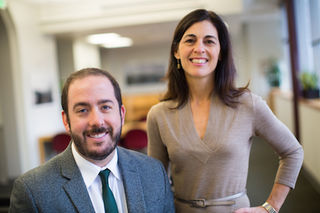Sexual Abuse
Organizations Must Do More to Prevent Child Sexual Abuse
Organizations serving youth need strong child sexual abuse prevention policies.
Posted March 22, 2017

On Monday, March 6, 2017, the U.S. Attorney’s Office of Western Pennsylvania and the Diocese of Altoona-Johnstown announced sweeping reforms to prevent child sexual abuse and provide more support for victims.
Last year, a grand jury report revealed decades of allegations of child sexual abuse in the Diocese of Altoona-Johnston. Pennsylvania Attorney General Kathleen Kane compiled and released a 147-page report based on the Diocese’s secret records that detailed the abuse of hundreds of children by more than 50 priests and clergy.
Ryan Shields, Ph.D., associate director at the Moore Center and I (pictured above) were asked to make recommendations for how the Dioceses should reform policies and procedures to make child sexual abuse prevention a focus.
One key recommendation we made is that training adults on how to intervene as bystanders when they see troubling behavior that is not yet abusive may be the single most important prevention tactic that institutions can take to prevent child sexual abuse.
Many people who offend against children do so for situational reasons and might be prevented at an early point by a friend, colleague or supervisor who notes, for example, that a priest is spending extra time with a specific child and has broken organizational policies or rules (e.g., by engaging in one-on-one texts with the child).
We suggested that the Diocese add the following information to their reformed policies and procedures:
- Involve the broader congregation in prevention programming.
- Adapt a dynamic approach to child protection in which reports of child sexual abuse are shared across all settings and are identified and addressed promptly.
- Make clear what steps a spiritual director might take if he knows or suspects that a seminarian is sexually interested in children or has ever sexually abused a child or viewed sexually abusive images of children.
- Improve the internal review board by establishing a clear structure of responsibility and authority regarding, for example, monitoring, and documenting compliance with policy and practice.
The collaboration between U.S. Attorney’s Office and the Altoona-Johnstown Diocese resulted in a memorandum of understanding, which states that the Diocese is “committed to protect children and reduce the risk of sexual abuse by diocesan personnel.”
The way organizations like the Diocese respond to the first allegation of sexual abuse can set the stage for how future allegations are handled. That’s why it is critical that organizations have processes and policies in place for handling reports of sexual abuse that include swift police reporting and include prevention programming for all members to prevent abuse from occurring in the first place.
The U.S. Attorney’s Office press release can be found here.


